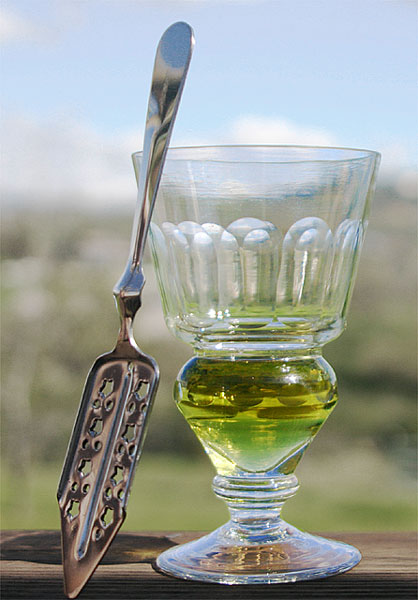

Posted on 04/30/2008 3:45:26 PM PDT by blam
Absinthe Uncorked: The 'Green Fairy' Was Boozy -- But Not Psychedelic
ScienceDaily (May 1, 2008) — A new study may end the century-old controversy over what ingredient in absinthe caused the exotic green aperitif's supposed mind-altering effects and toxic side-effects when consumed to excess. In the most comprehensive analysis of old bottles of original absinthe -- once quaffed by the likes of van Gogh, Degas, Toulouse-Lautrec and Picasso to enhance their creativity -- a team of scientists from Europe and the United States have concluded the culprit was plain and simple: A high alcohol content, rather than thujone, the compound widely believed responsible for absinthe's effects. Although consumed diluted with water, absinthe contained about 70 percent alcohol, giving it a 140-proof wallop. Most gin, vodka, and whiskey are 80 -- 100-proof and contain 40-50 percent alcohol or ethanol.
Absinthe took on legendary status in late 19th-Century Paris among bohemian artists and writers. They believed it expanded consciousness with psychedelic effects and called it "the Green Fairy" and "the Green Muse." The drink's popularity spread through Europe and to the United States. However, illness and violent episodes among drinkers gave absinthe the reputation as a dangerous drug, and it was banned in Europe and elsewhere.
In the new study, Dirk W. Lachenmeier and colleagues point out that scientists know very little about the composition of the original absinthe produced in France before that country banned the drink in 1915. Only a single study had analyzed one sample of preban absinthe. The researchers analyzed 13 samples of preban absinthe from sealed bottles -- "the first time that such a wide ranging analysis of absinthe from the preban era has been attempted," they say.
The analysis included thujone, widely regarded as the "active" ingredient in absinthe. "It is certainly at the root of absinthe's reputation as being more drug than drink," according to Lachenmeier. Thujone was blamed for "absinthe madness" and "absinthism," a collection of symptoms including hallucinations, facial contractions, numbness, and dementia.
However, the study found relatively small concentrations of thujone, amounts less than previously estimated and not sufficient to explain absinthism. Thujone levels in preban absinthe actually were about the same as those in modern absinthe, produced since 1988, when the European Union (EU) lifted its ban on absinthe production. Laboratory tests found no other compound that could explain absinthe's effects. "All things considered, nothing besides ethanol was found in the absinthes that was able to explain the syndrome of absinthism," according to Lachenmeier.
He says that scientific data cannot explain preban absinthe's reputation as a psychedelic substance. Recent historical research on absinthism concluded that the condition probably was alcoholism, Lachenmeier indicates.
"Today it seems a substantial minority of consumers want these myths to be true, even if there is no empirical evidence that they are," says Lachenmeier. "It is hoped that this paper will go some way to refute at least the first of these myths, conclusively demonstrating that the thujone content of a representative selection of preban absinthe... fell within the modern EU limit."
The study "Chemical Composition of vintage Preban Absinthe with Special Reference to Thujone, Fenchone, Pinocamphone, Methanol, Copper, and Antimony Concentrations" is scheduled for the May 14, 2008 issue of the Journal of Agricultural and Food Chemistry.
Adapted from materials provided by American Chemical Society, via EurekAlert!, a service of AAAS
Absinthe was banned because it took market share from wine.
As a friend used to say, “Absinth makes the heart grow fonder.”


Boooooooooo,Hisss.........
I have a couple friends say this stuff works. I been trying to get some from overseas thru a friend so i can try it. Any freepers have experience with this stuff?
Funny, you can purchase absinthe in Europe, but not in the United States. I wonder what else the writer gets incorrect.
If you finish reading the article, you’d know that it was reinstated for sale in Europe recently.
I’ve had it, and it’s just plain old booze.
1988 is “recently?”
They likely had other substances available then and absinthe was merely one of them.
As my husband used to say during his traveling days, "Absence makes the fond grow harder."
It’s tasty, has an interesting buzz, kind of like mixing a very small amount of pot with a large quantity of booze. Worth trying once just to say you did it.
Go watch the No Reservations Paris episode. Bourdain began to hallucinate badly.
Absinthe was originally the drink of the lower classes because it was a cheap high - you got more bang for your buck. The Paris bohemians took it up for the same reason. Arch-eccentric Alfred Jarry made absinthe his intoxicant of choice, but then graduated to ether which packed an even harder wallop. He died young, bien sur.
If you instead brew the herb in hot water, would that lead to drinkers suffering absinthteaism?
google absinthe before saying u.s. sale is illegal or not available.
I have drunk it (brought some back from New Zealand, where it is legal). I like the stuff, but it doesn’t like me...gives me heartburn. Very tasty, though, in a medicinal sort of way.
Serious drinkers respond to me beyond this point only.
Disclaimer: Opinions posted on Free Republic are those of the individual posters and do not necessarily represent the opinion of Free Republic or its management. All materials posted herein are protected by copyright law and the exemption for fair use of copyrighted works.